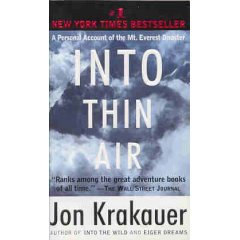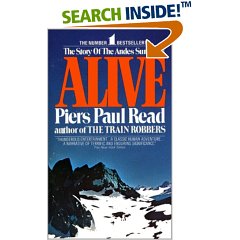
And other words reviewers use.
Sure, it was published in 1997. Sure, I've had it on my bookshelf probably since then.
No matter, I just finished reading it last month and loved it. In fact, I appreciate it so much that it kept me up at night. I'd start reading before I went to bed (around midnight) then I'd stay up reading until 2 and 3 in the morning. I'd wake up the next morning thinking about Rob on top of that mountain, unable to come down. I'd walk to my car thinking of the Hillary Step and wondering how big it is (40 feet of snow at 28,750 feet) and if Edmund Hillary knew that it would forever be known for him. (If there were a Daugherty Step it would be the three stair drop covering the turn in the stairway that led to my bedroom in Marion. I used the floor-to-ceiling pole next to the stairs to aid my rapid descent.)
For Christmas I want a yak, an ice axe and crampons.
In keeping with the survival theme, I started reading Alive, by Piers Paul Read this week. (The copy, given to me by a friend who I'm sure did not read it, is yellowed and horribly typeset.) The story itself is far more harrowing than the Everest disaster of 1996, which is was Into Thin Air is about. But the writing isn't as good, so the book isn't quite the page turner that Into Thin Air is.
Mostly, I find myself reading the first few sentences of each graph and then skipping the rest. The writing doesn't have enough momentum to carry its readers, so I'm just looking forward to the end and finding out who survives, how they're found, how many of their dead friends they have to eat.
It's interesting: Both books start out essentially the same way - you know what ultimately happens (who dies) well before the end of the book, so neither are "what happens at the end" type of books. But Krakauer in Into Thin Air propels the story through his writing, building characters, creating suspense, etc., while Read approaches it more textbook-like, i.e. Here's what happens first, then this happens, and after that this happens. So far (nearly halfway), it's not that great of a read. But the story is pretty awesome.
An interesting complaint here: Aside from the fact there is virtually no character development (meaning that when they do die, I don't really care too much), is that there isn't enough detail as to them eating their friends. I'd like more specifics, such as how they cracked through the bones, if the others who didn't cut the meat knew who they were eating, if there was any method to who was eaten first and if different parts of the body tasted better than others. (Leg meat vs. back meat. Hearts vs. liver.) Because if you haven't read the book (and I don't think I'm giving anything away here), they eat everything except for the head, skin, lungs and genitals. (So that's a-go on the heart, kidneys and intestines.)
In a less death-defying note, I bought Cash by Johnny Cash this weekend at the new Borders in Crestview Hills. It'll probably be only five or ten years before I read it.







